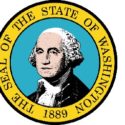On November 11, 1889, Washington became the 42nd state of the Union.
Washington was one of the states included in the Omnibus bill that brought in four states after 13 years with no new states at all.
Washington state began their quest for statehood in 1850, when they were still part of Oregon. They felt that their interests were different from those in Southern Oregon, so they asked Congress to make them the Territory of Columbia. Congress said no, but they kept asking. Eventually, they were allowed to become a separate territory. They were not allowed to call themselves Columbia, for fear that people would mix them up with the District of Columbia.
They became Washington Territory, instead. By now, it’s clear that Washington State and Washington D.C. are more confusing than Columbia State and D.C. would have been, but it can be hard to predict the future. Washington they remained.
Blank ballots
Washington asked voters to say yes or no on statehood in 1869 and 1871. In both cases, fewer than half of the voters answered the statehood question. The majority left the statehood question blank as they voted on local officials. What’s more, only 1,000 people voted in 1871.
How did the territory of Washington deal with those blank votes? Just as all the states do: by ignoring them. Leaving a ballot question blank has no meaning in the United States.
How did they handle the people who chose not to vote? Just as all the states do: by ignoring them. People who choose not to vote have no voice in U.S. elections.
Of the people who voted in those early Washington status votes — the only ones who matter in decision making by vote — the majority said no to statehood.
In Puerto Rico’s 2012 plebiscite, the anti-statehood party tried to claim that all the ballots with questions left blank were in fact votes for “enhanced commonwealth,” which is not a viable status option and was therefore not on the ballot. The truth is, 61% of voters chose statehood.
In the 2017 plebiscite in Puerto Rico, 97% of voters chose statehood. Once again, the people who vote are the only ones with voices. The “commonwealth” party tried to claim that all the people who did not vote should be counted for the opposition.
The statehood supporters in Washington could have claimed that all the voters who did not answer the statehood question were actually voting for statehood. They didn’t, because it would have been an absurd claim.
It’s still absurd to make that kind of claim.
Messy politics
Politics in Washington were messy in the 1880s. Some people wanted to change the borders, others disagreed on where the capital of the new state should be, and people in one part of Washington were downright spiteful to the people in other parts. Like other Western states, Washington had controversy over the railroads, over whether women should vote, and on whether alcohol should be illegal. Violence was still an issue in frontier Washington, as was anti-immigrant feeling.
Congress looked at all this and argued that Washington wasn’t civilized enough for statehood. They needed to get their act together, some members of Congress said, before they could become a state.
But the Democratic Party controlled Congress at that time, and many people thought that they were just unwilling to admit a Republican state. Western statehood became an issue in the presidential election of 1888. Benjamin Harrison won the election in the electoral college, even though Grover Cleveland got the majority of the popular votes. Cleveland quickly signed the omnibus bill admitting Washington, along with Montana and the Dakotas, as long as they could get a state constitution passed.
Lessons for Puerto Rico
Obviously, the example of Washington should help remind the anti-statehood party in Puerto Rico that people who don’t vote have no voice in American politics. Puerto Rico has voted twice for statehood and has officially asked Congress to admit the territory as the 51st state. But Washington’s experience also shows that messy politics can slow down the path toward statehood, but can’t stop it.
Just like Washington, Puerto Rico will become a state in time. Tell your legislators that Puerto Rico is ready for statehood.








No responses yet